Training and Guidelines
| Publication Cover | Title |
|---|---|
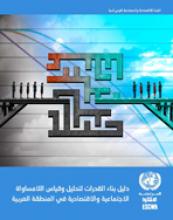 |
Capacity building toolkit on the analysis and measurement of a socio-economic inequalities in the Arab region E/ESCWA/SDD/2017/TECHNICAL PAPER.21 The capacity building toolkit on the analysis and measurement of socio-economic inequalities in the Arab region was produced as part of ESCWA’s efforts to build capacities to analyze and measure... |
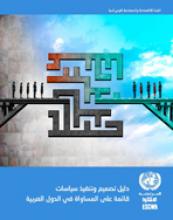 |
Toolkit on the design and implementation of equality-oriented policies in the Arab countries E/ESCWA/SDD/2017/TECHNICAL PAPER.11 ESCWA has prepared the toolkit for designing and implementing equality-oriented public policies and programmes in the Arab countries as part of its efforts to support member countries in... |
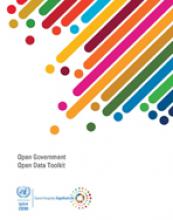 |
Open Government Open Data Toolkit E/ESCWA/CL4.SIT/2021/MANUAL.2 The open data toolkit is a brief guide for initiating, planning, implementing, and evaluating open data programmes in the Arab region. It includes five sections, covering planning and management... |
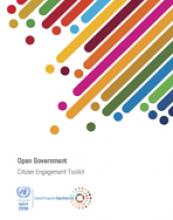 |
Open Government: Citizen Engagement Toolkit E/ESCWA/CL4.SIT/2021/MANUAL.1 The citizen engagement toolkit is a brief guide aimed at promoting engagement in and implementation of open government in the Arab region. Prepared as part of ESCWA open government initiative,... |
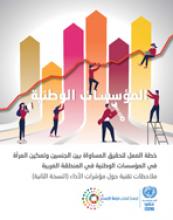 |
Action Plan on Gender Equality and Women’s Empowerment within National Institutions: Technical Notes (Second Edition) E/ESCWA/CL2.GPID/2020/TP.25 This publication, in its second version, provides necessary technical information and guidance on the implementation of an accountability framework for mainstreaming gender equality in the... |
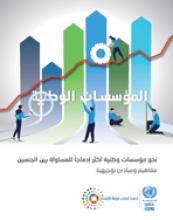 |
Towards More Gender Inclusive National Institutions: Concepts and Guidelines E/ESCWA/CL2.GPID/2020/TP.12 These guidelines aim to support national institutions in implementing the action plan on gender equality and the empowerment of women at the level of national institutions by providing the... |
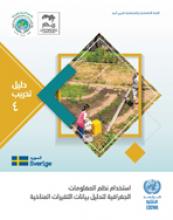 |
Guidebook on Use of GIS for Climatic Data Analysis E/ESCWA/SDPD/2019/GUIDE.4 This guidebook is the fourth of a series of guidebooks produced by ESCWA in cooperation with the Arab Center for Studies of Arid Zones and Drylands (ACSAD) in relation to irrigation water... |
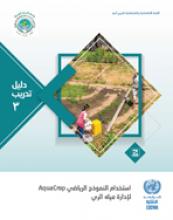 |
Guidebook on Using AquaCrop for Irrigation Water Management E/ESCWA/SDPD/2019/GUIDE.3 This guidebook is the third of a series of guidebooks produced by ESCWA in cooperation with the Arab Center for the Studies of Arid Zones and Dry Lands (ACSAD) in relation to the use of Aquacrop... |
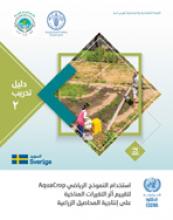 |
Training Manual for Using AquaCrop model to evaluate the Impact of Climate Change on crop Production E/ESCWA/SDPD/2019/GUIDE.2 Within the context of Food Security, ESCWA is implementing a Sida funded project on “Promoting food and water security through cooperation and capacity development in the Arab region” that... |
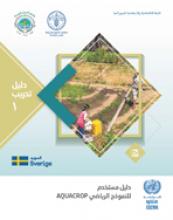 |
User Guide Manual for AquaCrop Model E/ESCWA/SDPD/2019/GUIDE.1 Within the context of Food Security, ESCWA is implementing a Sida funded project on “Promoting food and water security through cooperation and capacity development in the Arab region” that... |
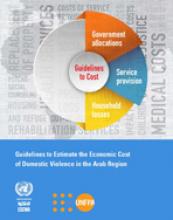 |
Guidelines to Estimate the Economic Cost of Domestic Violence in the Arab region E/ESCWA/ECW/2019/TP.3 These guidelines are intended for government officials, programme managers and researchers looking to estimate the costs of domestic violence in the Arab region. They... |
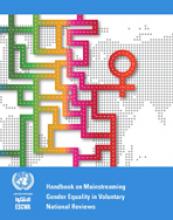 |
Guidelines for Mainstreaming Gender Equality in Voluntary National Reviews E/ESCWA/ECW/2019/TP.1 This guide aims to support stakeholders in mainstreaming gender equality and women’s rights in Voluntary National Reviews (VNRs) on progress made in the implementation of agenda 2030 and the... |
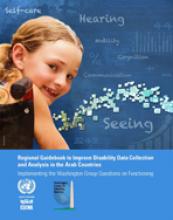 |
Regional Guidebook to Improve Disability Data Collection and Analysis in the Arab Countries E/ESCWA/SD/2018/MANUAL.1 This regional Guidebook explores the different approaches in design, implementation and analysis of disability data collection in the Arab countries, in view of improving the standardization and... |
 |
Guidebook for Project Developers for Preparing Renewable Energy Investments Business Plans E/ESCWA/SDPD/2017/TECHNICAL PAPER.2 The purpose of the guidebook is to help local project developers and investors to prepare bankable business plans for RE projects, particularly for power generation. It introduces standard... |
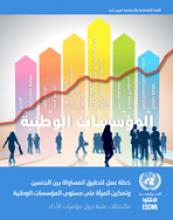 |
Action Plan on Gender Equality and the Empowerment of Women at the Level of National Institutions: Technical Notes E/ESCWA/ECW/2017/TECHNICAL PAPER.8 This publication provides necessary technical information and guidance on the implementation of an accountability framework for mainstreaming gender equality in the organizational practices,... |
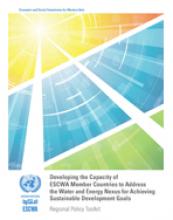 |
Developing the Capacity of ESCWA Member Countries to Address the Water and Energy Nexus for Achieving Sustainable Development Goals E/ESCWA/SDPD/2016/MANUAL Developing the Capacity of ESCWA Member Countries to Address the Water and Energy Nexus for Achieving Sustainable Development Goals: Regional Policy Toolkit The water and energy nexus... |
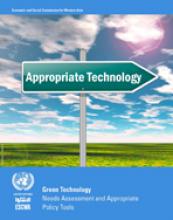 |
Green Technology Needs Assessment and Appropriate Policy Tools E/ESCWA/SDPD/2016/GUIDE (PART I) The guide serves a dual objective. First, it assists rural development practitioners in assessing green energy needs of rural productive businesses. Second, it helps policymakers use the right... |
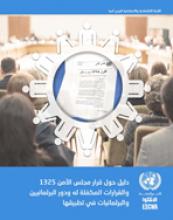 |
Security Council resolution 1325 and its complementary resolutions, and the role of parliamentarians in their implementation E/ESCWA/ECW/2015/TECHNICAL PAPER.4 The present guide sets out United Nations resolutions on women, and considers the four pillars of the women, peace and security agenda, namely prevention, protection, participation, and... |
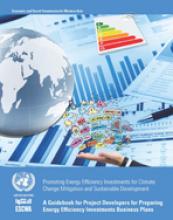 |
Guidebook for Project Developers for Preparing Energy Efficiency Investments Business Plans E/ESCWA/SDPD/2015/2/Manual The purpose of the guidebook is to help local project developers and investors to prepare bankable business plans for RE projects, particularly for power generation. It introduces standard... |
 |
Training manual on methodologies for data collection on energy use by the transport sector E/ESCWA/SD/2015/1/Manual The purpose of the manual is to provide a starting point for those in government bodies responsible for planning surveys; create a common understanding of terms and concepts; establish a common... |





